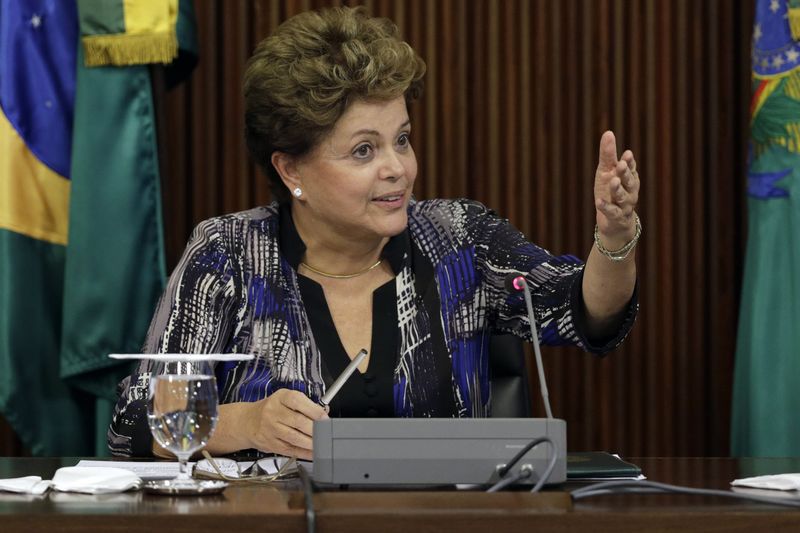By Brian Winter
BRASILIA (Reuters) - Brazilian President Dilma Rousseff is planning a package of budget cuts and tax increases worth as much as 100 billion reais ($36 billion) in an aggressive attempt to recover investor confidence at a time of growing strain on emerging markets, senior government officials told Reuters.
The fiscal adjustment, which is at the high end of market expectations, is the latest sign that Rousseff is adopting a significantly more austere and business-friendly agenda for her second term, which will start on Jan. 1.
It also comes as some of Brazil's peers are moving to shield themselves from falling commodities prices and a general loss of confidence in emerging markets. Russia's central bank hiked interest rates by 6.5 percentage points this week amid recent heavy declines in oil prices and its currency.
After a long boom last decade, Brazil's economy has averaged less than 2 percent annual growth, with high inflation, during Rousseff's first four years in office.
That mediocre record, along with disappointing tax collection, recent global instability, and falling prices for Brazil's commodities such as iron ore, convinced Rousseff to make a major policy change, the officials said on condition of anonymity.
As part of the shift, Rousseff will give her incoming finance minister Joaquim Levy, a former banker with a good reputation on Wall Street, "carte blanche" to run the economy as he sees fit, an official close to the president said.
Rousseff, a trained economist, personally made many of the policy decisions, such as targeted tax cuts, that eroded Brazil's finances and damaged investor confidence during her first term.
"It's a new term, with new ideas," the official close to Rousseff said.
The centerpiece of the shift under Levy will be the fiscal adjustment, which the official close to Rousseff said would total between 90 billion and 100 billion reais or about 2 percent of GDP. Rousseff's steepest budget adjustment to date was 55 billion reais in 2012.
The planned adjustment is almost identical to a proposal made by one of Rousseff's more centrist rivals, former Senator Marina Silva, during this year's presidential campaign. In late September, Rousseff said such a large budget adjustment could be "dangerous," adding: "We don't believe in a fiscal shock."
Asked what changed, the official said: "The economic situation has gotten much worse."
FOCUS ON SUBSIDIES
The officials said the exact size and composition of the fiscal package were still being finalized, but the key components had come into clear focus.
Most of the adjustment will come from cuts to budget spending and subsidies, as opposed to new taxes, the officials said. Brazil already has one of the highest tax burdens in Latin America, at about 39 percent of gross domestic product.
One official said cuts were likely for subsidies to the BNDES state-run development bank, as well as the bank's so-called Investment Sustainment Program, a program that finances the purchase of capital goods for companies and was worth about 100 billion reais last year.
Savings will also come from a rise in the so-called TJLP rate, at which the BNDES makes loans, the officials said. That rate was expected to rise as soon as Thursday.
The "Bolsa Familia" monthly subsidy to poor families and "My House, My Life" federal housing program will be exempt from cuts, although other social programs could be hit, the officials said. Some savings would also be achieved by "delaying" some spending during 2015, rather than cutting it outright.
"The first thing we must do is strengthen our fiscal position," a second senior official said.
That official said the government would be careful not to cause a "sudden stop" in economic activity with budget cuts, but added: "If we do this with some resolve, it will send the right signal of stability."
Levy, who is expected to formally succeed Finance Minister Guido Mantega in coming days, has been working out of a small office in Rousseff's palace since she announced his appointment on Nov. 27.
He believes that increased government savings should also eventually lead to a rise in Brazil's savings rate, which is low by emerging-market standards, the second official said.

That, along with efforts to increase productivity, should help put the economy back on a more solid growth path, the official added.
(Additional reporting by Alonso Soto; Editing by Kieran Murray)